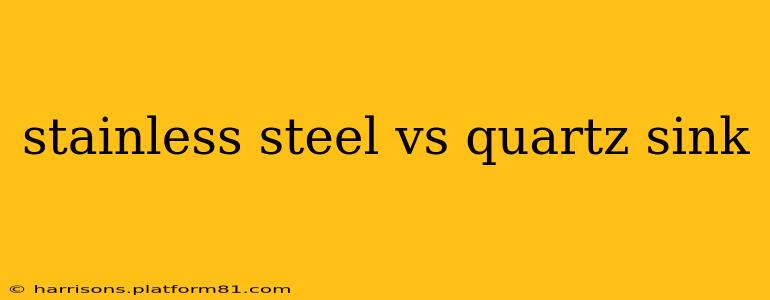Choosing the right kitchen sink can significantly impact both the functionality and aesthetics of your space. Two popular choices often top the list: stainless steel and quartz composite sinks. Both offer unique advantages and disadvantages, making the decision a crucial one. This comprehensive guide will delve into the key differences, helping you determine which material best suits your needs and lifestyle.
What are the Pros and Cons of Stainless Steel Sinks?
Stainless steel sinks are a long-standing kitchen staple, appreciated for their durability and classic appeal.
Pros:
- Durability: Stainless steel is incredibly resistant to scratches, stains, and heat damage. It can withstand heavy use and remains a reliable choice for years.
- Easy to Clean: A simple wipe-down is usually all it takes to maintain a stainless steel sink's cleanliness. Most stains and spills wipe away effortlessly.
- Cost-Effective: Generally, stainless steel sinks are more affordable than quartz composite sinks, making them a budget-friendly option.
- Hygienic: Stainless steel is a non-porous material, preventing the growth of bacteria and mold.
- Variety of Styles: From farmhouse aprons to sleek, undermount designs, stainless steel sinks are available in a wide range of styles to complement various kitchen aesthetics.
Cons:
- Noise: Water hitting a stainless steel sink can be quite loud, particularly if it's a thin gauge model.
- Susceptibility to Scratches (though less than you might think): While durable, stainless steel can show scratches from abrasive cleaners or dropped utensils. However, with proper care, these scratches are often minimal and don't impact functionality.
- Can Show Water Spots: Hard water can leave noticeable spots on stainless steel, requiring regular cleaning to maintain a sparkling finish.
What are the Pros and Cons of Quartz Sinks?
Quartz composite sinks, often made from a mixture of quartz and resin, offer a more modern and luxurious look.
Pros:
- Beautiful Aesthetics: Quartz sinks come in a wide variety of colors and patterns, allowing for a more personalized and stylish kitchen design. They often mimic the look of natural stone.
- Quiet Operation: Quartz sinks are significantly quieter than stainless steel, reducing noise during dishwashing.
- Stain and Scratch Resistant: While not indestructible, high-quality quartz sinks are highly resistant to stains and scratches.
- Non-Porous: Similar to stainless steel, quartz is a non-porous material, inhibiting the growth of bacteria and mold.
Cons:
- Cost: Quartz composite sinks are typically more expensive than stainless steel sinks.
- Can Chip or Crack: Although durable, quartz can chip or crack if subjected to significant impact.
- Repair Difficulties: Repairs on a chipped or cracked quartz sink can be costly and may not always be successful.
- Heat Sensitivity: While many quartz sinks can handle hot water, prolonged exposure to extreme heat can damage the surface.
What is the best material for a kitchen sink?
The "best" material depends entirely on your priorities and preferences. Consider these factors:
- Budget: Stainless steel is generally more affordable.
- Aesthetic Preferences: Quartz offers a wider range of colors and styles.
- Noise Level: Quartz is quieter.
- Maintenance: Both are relatively easy to clean, but stainless steel may require more frequent cleaning to avoid water spots.
- Durability: Both are durable, but quartz is more susceptible to chipping and cracking.
Which sink is easier to clean?
Both stainless steel and quartz sinks are relatively easy to clean. Stainless steel's non-porous surface makes it simple to wipe away spills and dirt. Quartz is also non-porous and easy to clean, though certain cleaners might damage the surface. Always check the manufacturer’s cleaning recommendations.
Are quartz sinks more durable than stainless steel sinks?
This depends on how "durability" is defined. Stainless steel is highly resistant to scratches and stains, but can dent. Quartz is also highly resistant to scratches and stains, but is more vulnerable to chipping and cracking. Ultimately, both are durable, but in different ways.
How do I choose between a stainless steel and quartz sink?
Consider your priorities: If budget is a primary concern and you prefer a classic look with high durability and easy maintenance, stainless steel is an excellent choice. If you prioritize aesthetics, quiet operation, and a more modern look, despite a higher price point and potential for damage, quartz might be better suited to your needs. Weigh the pros and cons against your lifestyle and budget to make the most informed decision.
